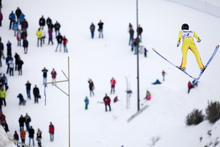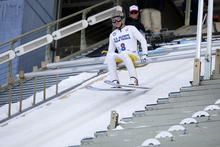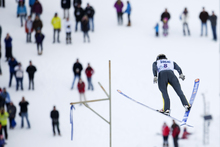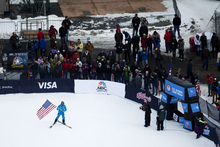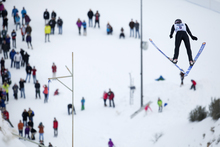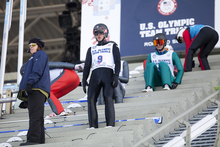This is an archived article that was published on sltrib.com in 2014, and information in the article may be outdated. It is provided only for personal research purposes and may not be reprinted.
Bill Demong easily could have walked away, a legend.
The longtime Park City resident was one of the heroes of the 2010 Vancouver Olympics, having finally — after years of agonizing struggle — become the first American to win a gold medal in Nordic combined. Soon after he received his medal, he asked his girlfriend to marry him (she said yes), and later carried the flag in the closing ceremony.
Cue the walking-into-the-sunset scene, right?
But Demong didn't want to quit.
He'd spent almost his whole life toiling away in his sport, the one that combines ski jumping and cross-country skiing, and wasn't ready to hang up his skis just yet. So with an eye toward returning to defend his title at the 2014 Sochi Olympics in Russia that begin this week, he did the only sensible thing.
He quit … for a while.
In the months after his life-changing performance, Demong took time away from his sport to relax, recharge, travel and "get caught up on life." He worked on his house, threw out the first pitch at a Mets game — he's a native New Yorker — visited military bases and dived into bike racing. Played with everything but the skis, basically.
"The one thing I didn't want was to blow out of Vancouver, maybe even kill it the next year, and end up maybe lacking now for motivation," he said.
Doesn't look like that's going to be a problem.
The 33-year-old will compete in his fifth Olympics in Sochi, headlining a team that's capable of returning to the podium in a sport in which they once appeared doomed to never break through.
After taking silver in the team event in Vancouver, the Americans rebuilt their roster — Park City's Bryan and Taylor Fletcher have replaced retired Johnny Spillane and Brett Camerota, alongside Demong and six-time Olympian Todd Lodwick — and claimed bronze at the world championships last year, suggesting that they are just as strong as ever.
"We definitely have big expectations," Bryan Fletcher said. "We know that people are watching us, but we know that we can do it. When these big events come, we're some of the best athletes on the planet for Nordic combined. That's big."
And for Demong, it's vastly different.
No longer is he the perpetual also-ran with more setbacks to endure than triumphs to enjoy.
He doesn't have to dwell on the fourth-place finish at the 2002 Salt Lake Olympics, when his team fell out of medal position during the cross-country relay, or sleep on what once seemed like an endless supply of eighth-, ninth- and 14th-place finishes that progressively cranked the pressure to medal higher and higher.
"That was probably the hardest part of the whole process," Demong said, "breaking down the barriers that we perceived were preventing Americans from succeeding in the sport.
"Even after 2002," he added, "when we were so bitterly super-close, you were like, 'Of course, we've been there, we're so close, we can do it.' But there's always that part of you that's like, 'But maybe not.' Maybe it was a curse, as irrational as that is. … Even in Vancouver, heading into those Games, knowing full well we had just swept the world championship individuals the year before, and knowing that we were capable of it, we still had to be just a little bit more nervous because it was the first one and nobody had ever done it."
But all that is gone now, and Demong is looking forward to almost a relaxed atmosphere, heading into Sochi.
Not that he's not focused, though.
In fact, Demong said he's even more tuned into his training now, since the birth of his 2-year-old son Liam.
"I was a little bit of a cowboy going into Vancouver," he said. "I was racing bikes all summer, I wrote my own program. If I wanted to jump into my truck and drive into the mountains for the night, I did that. I went and hunted elk if I felt like it.
"Now I have a 2½-year old," he said. "I'm out the door at six-oh-oh, I'm dropping him off at day care. … You become much better at time management, which I think has made me a much more focused athlete. There's no opportunity to make up for lost time. I don't get to just like start my workout at noon if I feel like it."
But that's a good thing, just as his success over the years has helped change the perception of his sport in a country where it's a far cry from football or basketball.
That same thing has been happening in other Nordic sports such as cross country and ski jumping, where Americans are poised to win historic medals in Sochi.
Kikkan Randall and Jesse Diggins are the reigning world team sprint champions in cross country, for example — no American has ever won an Olympic medal in that sport — and Park City's Sarah Hendrickson is the world champ in women's ski jumping, which will be held for the first time at an Olympics.
"I think the U.S. is almost, especially the younger generation, forgetting that we ever were not good at these sports," Demong said, "which is a pretty big shift, I think. … Now I think most people expect us to medal, and that's a difference, for sure."
And for Demong personally, he's right where he hoped he would be, after taking that little mini-retirement after Vancouver.
Although he hasn't reached the podium in a World Cup race this season — his best finish was eighth — he has been energized by his time away and has rediscovered the motivation that comes, for him, in having to start all over.
"I find it's powerful to be in the pit again," he said, "and have to fight your way back up." —
Nordic combined
• The event combines ski jumping and cross-country skiing, and has been in the Olympics since 1924.
• Athletes ski jump first, then contest a cross-country race on the same day. It's the only sport in the Olympics that excludes women.
• The best jumper starts the race first, and others follow at time intervals determined by jump scores. First across the finish line wins.
• Athletes compete in three separate events in Sochi — individual races with jumps off a "normal hill" and a "large hill," each followed by a 10-kilometer cross-country race, and a team relay.








